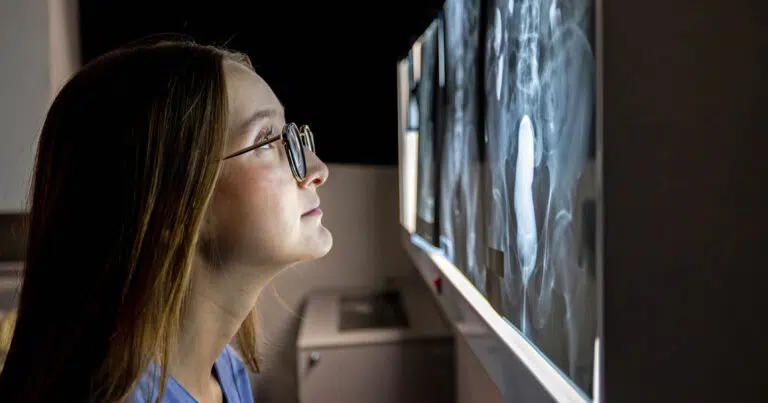Travel Radiology Technologist Salary Guide
- Requirements
- Travel Radiology Technologist Salary Insights
- Top Travel Radiology Technologist Jobs
- Featured Blog Posts
- Salary Tips
- Travel Radiology Technologist FAQs
An interventional radiology (IR) technologist is a radiologic technologist with specialized training in assisting with minimally invasive procedures. Physicians use small tools and imaging equipment to diagnose and treat diseases during IR procedures. The IR tech assists by performing imaging scans, administering contrast material, monitoring patients and informing other team members of any concerning patient status changes. IR technologists assist with various procedures, including angioplasty, clot embolization and stent placement.
How do you become an interventional radiology technologist?
At a minimum, you must complete an associate's degree in radiologic technology, which typically takes 2 years. Radiologic technology programs usually include courses in anatomy and physiology, radiographic physics, patient care and radiographic positioning. You should also expect to complete a clinical practicum, allowing students to apply what they've learned in class. During your practicum, you get hands-on experience working with patients and operating radiographic equipment.
According to the American Society of Radiologic Technologists, 47 states require all interventional radiologic technologists to be licensed as of 2022. The exact licensing requirements depend on where you live.
What credentials/licensing does an interventional radiology technologist require?
Many states require radiologic technologists to obtain national certification as part of the licensing process. For example, Arizona includes a credential from the American Registry of Radiologic Technologists (ARRT) or the Nuclear Medicine Technology Certification Board (NMTCB) as part of its process. In addition to the Radiography RT certification, ARRT offers several relevant credentials, including Vascular-Interventional Radiography RT and Cardiac-Interventional Radiography RT certifications.
NMTCB offers the Radiation Safety Certification, which helps radiologic technologists demonstrate their competency in safety matters related to using X-rays, computed tomography equipment, fluoroscopy and magnetic resonance imaging. Check with your state's licensing body to find out if you need a certification from either organization.
Average Travel Radiology Technologist Salary
$2,343/week
The average salary for a Travel Radiology Technologist is $2,343 per week. This is 5% lower than the practicing US average of $2,464.
Last updated on December 20, 2025. Based on 4,108 active jobs on Vivian.com in the last 7 days.
Salaries for Travel Radiology Technologist compared to Allied Health Professional National Averages
$2,343/week
5% lower than the practicing US average.
$2,464/week
United States
Where do Travel Radiology Technologists get paid the most?
| State | Average Weekly Salary | Max Weekly Salary |
|---|---|---|
| Alaska | $3,558 | $4,520 |
| District of Columbia | $3,230 | $3,230 |
| South Dakota | $2,834 | $3,391 |
| Idaho | $2,823 | $3,631 |
| Minnesota | $2,747 | $3,409 |
| New Jersey | $2,739 | $3,781 |
| Missouri | $2,733 | $3,102 |
| Connecticut | $2,676 | $3,446 |
| North Dakota | $2,655 | $3,300 |
| New York | $2,647 | $4,184 |
| Vermont | $2,647 | $3,300 |
| West Virginia | $2,630 | $2,997 |
| Wyoming | $2,562 | $2,966 |
| Maryland | $2,552 | $2,861 |
| New Hampshire | $2,550 | $3,152 |
| Massachusetts | $2,519 | $3,915 |
| California | $2,480 | $3,735 |
| Ohio | $2,456 | $3,385 |
| Montana | $2,448 | $3,066 |
What cities pay the most for Travel Radiology Technologists?
| City | Average Weekly Salary | Max Weekly Salary |
|---|---|---|
| Juneau, Alaska | $4,074 | $4,520 |
| Oakland, California | $3,735 | $3,735 |
| Nampa, Idaho | $3,502 | $3,631 |
| Decatur, Georgia | $3,335 | $3,335 |
| Hillsboro, Oregon | $3,276 | $3,276 |
| Eureka, California | $3,237 | $3,237 |
| Washington, District of Columbia | $3,230 | $3,230 |
| Allentown, Pennsylvania | $3,220 | $3,220 |
| Alturas, California | $3,166 | $3,166 |
| Syracuse, New York | $3,165 | $3,165 |
What are the highest paying Employers and Agencies for Travel Radiology Technologist jobs?
| Average Weekly Salary | Max Weekly Salary | |
|---|---|---|
| DT-Healthcare Staffing | $3,646 | $3,646 |
| Fastaff Travel Nursing | $3,548 | $3,761 |
| IMCS GROUP | $3,520 | $3,520 |
| Aimic Inc | $3,400 | $3,400 |
| Millbrook Support Services | $3,300 | $3,300 |
| Elite Medical Staffing | $3,270 | $3,270 |
| Express Healthcare Staffing of Tualatin Oregon | $3,260 | $3,260 |
| Infojini Healthcare I | $3,166 | $3,166 |
| Alliance Services, Inc. | $3,140 | $3,520 |
| Wellspring Nurse Source | $3,105 | $4,516 |
Last updated on December 20, 2025. Information based on active jobs on Vivian.com.

Travel Radiology Technologist Career Guide
Use our exclusive Career Guides to research the education, qualifications, skills and responsibilities for a variety of healthcare disciplines and specialties employers are hiring now.
Go to the guideTop Travel Radiology Technologist Jobs
Diagnostic Imaging Manager
- Juneau, Alaska
- Ethel Lund Medical Center
- Jackson HealthPros and 21 others
$3,596-4,516/week
Radiologic Technologist (Mammography & Multi-Modality)
- Wrangell, Alaska
- Wrangell Medical Center
- Jackson HealthPros and 29 others
$2,972-3,805/week
Interventional Radiology Technologist
- Traverse City, Michigan
- Munson Medical Center
- Daisy Medical Staffing and 3 others
$3,536-3,796/week
Interventional Radiology Cath Lab Technician
- Denville, New Jersey
- Saint Clare's Hospital - Denville
- TRS Healthcare and 16 others
$2,610-3,781/week
Estimated pay packageCT/X-Ray Technologist
- Wisconsin Rapids, Wisconsin
- Marshfield Medical Center
- TRS Healthcare and 21 others
$2,852-3,670/week
Get alerts about new jobs and salary trends
Be the first to know about new jobs for Radiology Technologists with the salary that suits you.
How can you increase your pay as a travel interventional radiology technologist?
Consider accepting travel assignments to earn more money as an interventional radiology technologist. As previously mentioned, the average hourly rate for staff IR techs is $30.34, just under $1,214 per week if you work 40 hours. Travel IR techs earn an average of $2,687 weekly, more than twice the rate for staff jobs.
How much does a travel interventional radiology technologist make?
According to Vivian Health's salary data for the week ending April 15, 2023, travel interventional radiology technologists earn an average of $2,687 per week. If you accept a 13-week contract, that's $34,931 for one assignment.
Do travel interventional radiology technologists get paid more than staff interventional radiology technologists?
How much you earn as an interventional radiology tech depends on many factors, but travel techs generally get paid more than staff techs. As noted above, a travel IR tech earns an average of $2,687 per week, more than double what a staff IR tech makes by working 40 hours at the average hourly rate of $30.34.
Travel salaries tend to be higher because hospitals and other medical facilities rely on travelers to help them overcome critical staffing shortages. Some travel IR techs also accept assignments in rural hospitals, which often have difficulty finding qualified employees for less desirable locations away from bigger cities.
Featured Blog Posts
Featured Blog Posts



Travel Radiology Technologist FAQs
What professional certifications can potentially increase my salary as a Radiology Technologist?`
Earning your Sonography RT (S-ARRT) or Positron Emission Technology (PET-NMTCB) often increases your salary potential as a radiology technologist or makes you eligible for another position with greater responsibilities, which also might include a bump in wages.
Earning the Fluoroscopy Permit (CA) is required if you reside in California and need to operate fluoroscopy equipment as part of your job.
Can having a Sonography RT (S-ARRT) boost my salary as a Radiology Technologist?
Yes, having a Sonography RT (S-ARRT) or any relevant professional certification has the potential to boost your salary as a radiology technologist.
Can having a Positron Emission Technology (PET-NMTCB) boost my salary as a Radiology Technologist?
Yes, having a Positron Emission Technology (PET-NMTCB) or any relevant professional certification has the potential to boost your salary as a radiology technologist.
Where can I learn more about working as a Travel Radiology Technologist?
Take a look at Vivian's Travel Radiology Technologist Career Guide for more information, including required education, responsibilities, pros and cons and more.